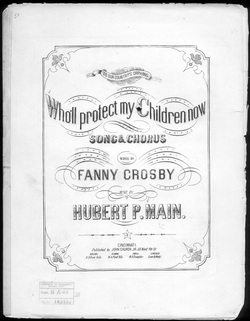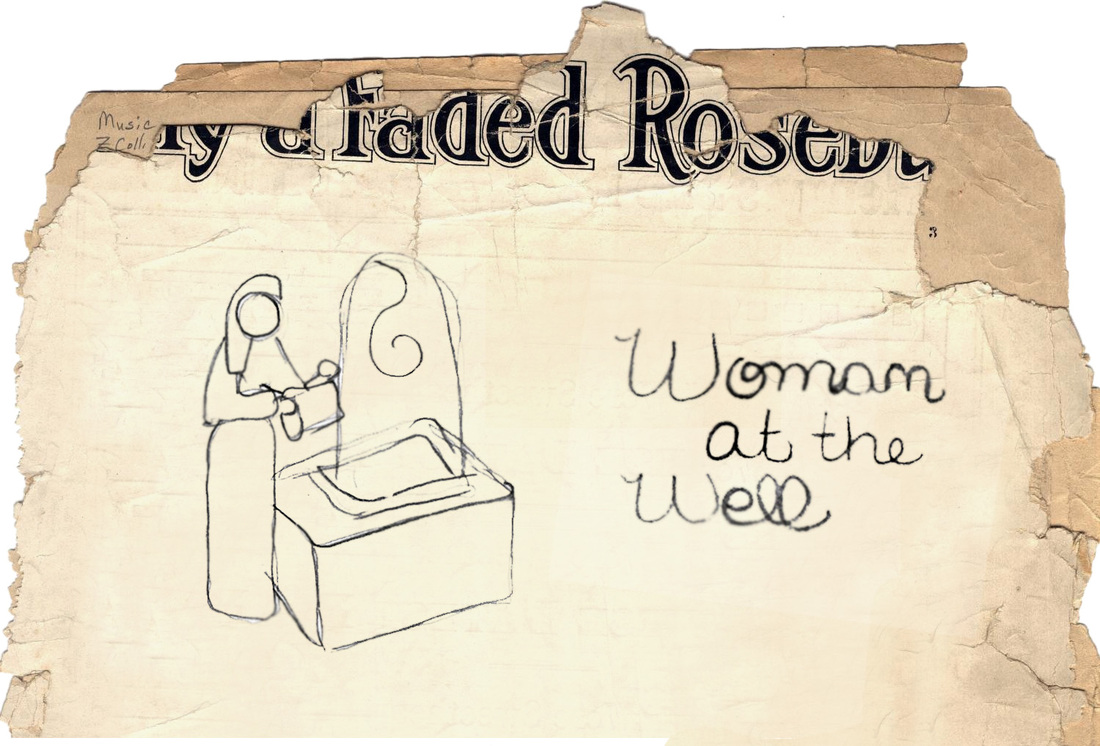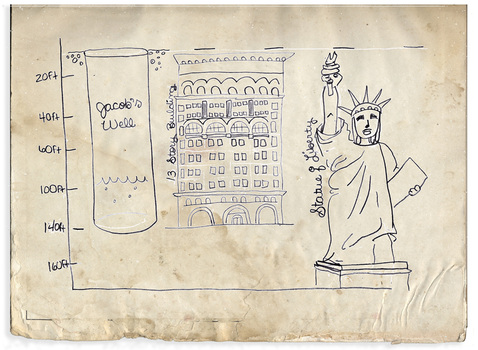|
Sometimes our Christian journey can feel a little bit like Psalm 23: Beautiful and simple. There is something very innocent about Psalm 23. I love the analogy of being a lamb in God's care. I don't have to think about it. I don't have to pick it apart. It simply exists for me to appreciate. Like I can just appreciate the imagery. I can imagine the smell of new grass, as I imagine lying in greenfields. I love lying in it. It brings back images of being a kid. (Back when I didn't think about the bugs and dirt that came with grass.) Reading about peaceful waters makes me want to take off my shoes and dip my feet in. There are days where I rejoice in the simplicity of faith. My first sermon ever: "God is love. That's it. It's that simple." I basically repeated it for about five minutes back during a Youth Sunday. Sometimes it is nice to have those scriptures that make us deflate our brains and see the beautifully simple side of things. Sometimes our Christian journey can feel a little bit like Psalm 23: Outdated and overused. Nothing seems more overused and overdone than Psalm 23. Whenever I think about it, I naturally find myself repeating the King James Version. Just the language of the KJV separates me from the text. The scripture can be stuffy at times. It can symbolize tradition over Divine council. Sometimes I hear Psalm 23 and I can imagine the smell of really old bibles. (Strange, right?) It becomes difficult to come back to it time and time again, because I've come back to it time and time again. I get that way sometimes in Church. I feel like we are fighting the same battles over and over again. I begin to feel like I'm running the Caucus race from Alice in Wonderland. We are just going in circles to dry off. Nothing is really being accomplished. (I eventually remember great tasks often require repetition.) Sometimes our Christian journey can feel a little bit like Psalm 23: Overwhelming. I know this is hard to believe, but there are times I just choose to shut up. Sometimes I shut up because someone else needs a chance to speak. Other times I am overwhelmed by Church bullies and choose to shut my mouth. Psalm 23 is a scriptural bully. If anyone asks: what's your favorite scripture, there will always be a Psalm 23 contingent. As people share their favorite verse the Psalm 23 group begin countering with why the others are wrong. "I love John 3:16." "Psalm 23 is much more descriptive." "Micah 6:8 is the mantra by which I live." "Well, Psalm 23 has more to it." Chill! We can both exist with our own favorite scriptures. But often I just allow that battle to be won from the other side and not fight it. Church can get that way sometimes regarding battles that deserve to be fought. I have so much respect for those people who willingly sacrifice to speak the truth. When dealing with community dynamics, church can be a difficult place to speak the truth. Sometimes our Christian journey can feel a bit like Psalm 23: Gloriously diverse. It says something that I can find the same amount of meaning in the 23rd Psalm as my Great Grandmother found in it. It's one of those scriptures that are not really divisive because it presents itself as an invitation. Political, gender, social lines are erased with this Psalm. God is the Shepherd to all. At the end of the day, as stuffy, overused, and overwhelmed we are as Christians, we are still the Body of Christ. We are so different, and that's how it's supposed to be. If you like what you are reading there are many ways to connect:
Connection Board And as always, contributions are greatly appreciated. Reading this scripture, I wanted to meditate on the language of Jesus. I wanted to focus on just how confusing he could be. His mind always seemed to be focused on something other than the worldly. Instead, every step I took to research Jesus in the story opened more doors to the Samaritan woman. I discovered I was running away from her, not because her side of the story isn't intriguing or worthwhile to focus on, but because focusing on the woman in the woman in the well story is clique for a female pastor to take on. This week's scripture is a gold mine for feminist ministers: a Samaritan, already an oppressed group within the Jewish family, and also a female. Females were not exactly held to equal standards back then. It is preached so much because Jesus, the Messiah, speaks to her as an equal. It then turns into a sermon about equality to all no matter what. I am not saying it’s a bad message, I am just saying it is overdone. After last weeks meditation, I really don't want to play into cliques. I found my research was leading me to something else…  Imagine this woman with me. We don’t know too much about her; we don’t even know her name. (BTW- even Job’s daughters in the Old Testament had names.) This nameless woman had a difficult life. She had been married five times and was living with a sixth man she was not married to. Now before you draw conclusions about her character realize something about the time period. It was not her place to initiate marriage or divorce. Her life was in the hands of her family and her husband-to-be. Some historians consider the woman an adulterer, which would be a reason why her husbands continued to divorce. But, if you remember Mary, mother of Jesus, Joseph wanted to divorce her quietly because the punishment for adultery was stoning to death. Now either the woman had five great husbands who all divorced her quietly or perhaps this woman was not an adulterer at all. I believe she wasn't, but I don’t know what could have initiated divorce. A jealous other wife? Bad cooking skills? Being too vocal? Who knows, but it must have left her feeling less than average. It must have made her a point of negative interest in her town. When a woman’s success is based on getting married and having children, this woman was a complete failure. (Hey, we know so little about her, we don’t even know if she has kids.) What was she going to do?  One thing we know she did was avoid others. (Today, we are spoiled. First of all, we don’t live in a desert so water is not difficult to come by. Second, we need not go any further than our own kitchen sink to find it. If we are picky we can go to the grocery store and pick up designer water: water in special bottles, filtered with reverse osmosis, or with a slight fruity flavor added for taste. Like I said, spoiled.) The Samaritan Woman had to go to a well. We know that Jesus was just entering town, so he was probably on the outskirts of Sychar, not in the middle of it. Sychar was big city. (In a way, it's like the capital city for the Samaritans. After all, their place of worship was not far from the city.) The Samaritan woman probably lived more towards the center which means she would have passed one or two wells on the way to the well Jesus was waiting at. Let me push this further. Not only was this woman avoiding wells but also the people who drew water from them. If you were going to do some sort of outdoor chore, what time of day would you choose to do it? This Samaritan woman took her long walk, not in the cool morning or the crisp late afternoon. She went to gather water at high noon, possibly the worst time of day to do anything outdoors. Also, probably the time when there would be as little people as possible going to gather water. Not wanting to be around others this woman could have been ashamed, embarrassed, ostracized… you can put your own thoughts there. What we can pull from her actions is she had a need not to converse or interact with others. Needless to say, this woman was not in a good place. Now before the woman arrives at Jacob’s well, Jesus arrives with the Disciples. They probably had a long walk and Jesus probably was actually thirsty. There was a problem; this was not a shallow well. It wasn’t like he could drop a ladle down into it and pull up water. To give you an idea of how deep this well was, in 1935 an excavation team cleaned out Jacob’s well to find the bottom at 138 ft. A 13 story building would be about that length. The Statue of Liberty, from feet to torch, is only about 20 ft taller. That’s a deep well. So when the woman arrives, in serendipity, with a way to draw water from this very deep well, Jesus asks for some help. Now Jesus is unconcerned about social standing, who is supposed to hate who, or why he should like or dislike this woman. The Messiah comes to this woman not above her, but as her equal, and the woman notices. The woman cares actually. She’s been divorced five times. She is a Samaritan and he is a Jew. She is a woman. By Jewish law she is considered unclean. If Jesus were to drink from her pot he would be considered unclean as well. By trying to talk Jesus out of his request, she is demeaning herself. She is expressing how she really feels. Instead of persisting about actual water Jesus gives her something: self-worth. He told her he was going to give her living water. Now, just to bring in a point from the message I wanted to write but didn't. The word for ‘spring water’ in Hebrew is ‘living water.’ Saying ‘living water’ would not have sounded new or interesting to the woman, just another word for well water. The woman is caught up on the physical needs of the world. She wants living water because it would allow disassociating with the world even more. She would never have to take water from the well again. She could annex herself in her house, choosing not to associate with anyone. However, what Jesus gives her is the opposite, a reason to get out in public again. Through their conversation she goes from being a hermit to an evangelist. She does something spectacular, helping her town believe in Jesus, not because of her history but despite her history. God can take anyone God chooses and change the world. In this case, God took a broken woman.  I don’t know if you know anything about Fanny Crosby. She was a hymnist and an evangelist in the late 1800’s, early 1900’s. She was also blind. She was an amazing woman who did not allow her disability to keep her from what she felt was God’s calling in her life. Earlier in her career she was asked to speak for a group of blue collar workers. During her speech she felt called to help some son who had to be saved that night or not at all. She called out at the end of her speech, “If there is a dear boy here tonight who has perchance wandered away from his mother’s home and his mother’s teaching, would he please meet me after service.” There was a boy who came forward, around 18 years old who wanted to know if she was talking about him. His mother had died and he had promised to meet her in heaven but he was afraid he was going down the wrong path and would never make it. Fanny spent the evening talking with him about Christ. When she got back to her room she penned the lyrics to ‘Rescue the Perishing.’ She would years later recount the story behind the hymn to a group at a YMCA only to have the same man, now much older, come up to her and tell her how she had saved his life. That experience led her towards an evangelistic career. In her 60’s she made the choice to live in poverty in New York’s ghettos. She would spend her evenings visiting a local bar where more than drinking took place. She would go there day after day. She wasn’t going to avoid those in need. She wanted to rescue the perishing.
If you like what you are reading there are many ways to connect:
Connection Board And as always, contributions are greatly appreciated. On Tuesday I heard someone say what I have heard others say now for years: There is no war on women. I realized, for the first time, hearing those words felt like being kicked while I was down. Yes, I am grateful for what has been accomplished.
All this I understand and appreciate. I respect the matriarchs who have come before me. I pray for those who do not have the freedoms I have. I realize I am walking on hallowed ground when I do things previous generations had to really sacrifice to achieve. That's why it hurts so badly when I feel beat down by those who use previous matriarchs in order to get me to shut up. It feels like I am being told, "Whatever you are feeling, just stop talking about it. The fight is over." I guess that is difficult to grasp, especially considering my history and what I am aware of. I been through some stuff. (And I would substitute 'stuff' for another word which is more PG-13.) I watched, as my mother was almost killed by a drunk and abusive step-father. (Domestic abuse against women still exists in the United States.) Young girls are still being kidnapped and put into the sex trade. (It happens every day, right in front of all us.) Men are not judged even nearly as much by his body. Women cannot be on camera- film or photograph, without being manipulated on some level. Make-up is only the first level of taking away the natural female face. Photoshop is overused and turns women into meat. Eye candy. This alone lets me know the war on women is alive in well in subtle and dangerous ways. But, if I am wrong another war has taken it's place. The war on standards. I know some excellent women. By excellent I mean excellent. These women are mothers, wives, and/or sisters, and work full time. Some of these women work full time at home, cleaning, raising, and doing some totally awesome things like making quilts and other amazing crafts for the home. They take the kids to practices. They use their limited funds to put together meaningful birthday parties. I am humbled by their skill and creativity. Some of these women work full time in an outside job. They set the standard for their work incredibly high. They go above and beyond the specified task and do everything they need to do at home. If the war on women ended, women took the next step and set the standards incredibly high. They became teachers and gave 60 hour work weeks. They became ministers and took on a full time pastorate with the christian education position. Perhaps some stayed in the home, but took it to the next level. All these women, whether in the workforce or not, have been told, who they were or were not supposed to be, and ignoring it. Because, no matter what they were told they had to be, the most important was exceptional. And quite honestly, they put many men to shame. They raised their standards while men kept theirs. I know today there are no scriptures or flashy images. It's just, I've been kicked one too many times and I finally had to cry uncle. OK, you say the war on women is over. The war on standards has just begun. If you like what you are reading there are many ways to connect:
Connection Board And as always, contributions are greatly appreciated. Those who come regularly might be a bit puzzled. This is Wednesday. Meditations are always posted on Thursday. I know. I know. It might seem a bit off, but today is Ash Wednesday. I just want to write this week to explain it a bit.
If you like what you are reading there are many ways to connect:
Connection Board And as always, contributions are greatly appreciated. |
Categories
All
Archives
October 2023
|







 RSS Feed
RSS Feed